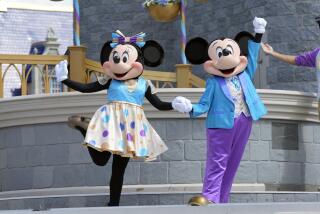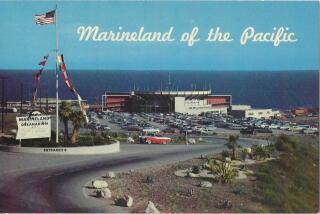Dolphin Group Urges Boycott of Sea World
- Share via
LOS ANGELES — A Miami-based environmental group on Monday called for a boycott of all Sea World parks and all products produced by Anheuser-Busch because the company has refused to rid its five marine theme parks of “petting pool conditions” that the group says endanger dolphins.
The call for the boycott was made by the Dolphin Project, which was joined by three other animal protection groups, all of which allege that the giant beer company’s parks regularly violate government restrictions by overcrowding dolphins in the pools and by putting too much chlorine in the water.
Speaking at a news conference at a Beverly Hills hotel, Scott Trimingham, president of the Sea Shepherd Conservation Society, a group participating in the boycott, claimed that dolphins in cramped tanks constantly injure themselves as they butt up against each other, and that inordinately high chlorine levels have been causing the animals to go blind.
Sea World executives contested the allegations, saying the pools meet government standards.
Sea World parks’ assistant zoological director, Brad Andrews, speaking at another news conference at the hotel, called the allegations false and said the activists are not qualified to comment on whether the dolphins’ living conditions are unsafe.
“The claims appear to be fabrications,” Andrews said. “In the industry, the people making these comments are nonentities. . . . We would not allow anything abnormal to happen to the dolphins. The pools are adequate.”
Andrews cited a U.S. Department of Agriculture letter addressed to Trimingham, who requested an investigation into the alleged suffering of dolphins being kept in petting tanks.
In the letter, USDA officials said a pool at Sea World in San Diego complies with the agency’s space stipulations. Still, Trimingham claimed that a pool at Sea World in Orlando, Fla., has failed to meet regulations. USDA officials also said the chlorine level in the two pools was acceptable by their standard.
Even when government regulations are met, Trimingham contended, there is no guarantee the animals are being protected.
He referred to USDA officials who formulate safety guidelines as “prostitute scientists”--those working for, or associated with, the marine park industry.
“By visiting Sea World, children have the opportunity to become acquainted with marine mammals and other ocean life, which is important in developing an awareness and concern for the future of these animals,” said Michael J. Roarty, a spokesman for Anheuser-Busch Companies in St. Louis.
“The educational benefits of the interactive pools--indeed all Sea Worlds’ operations--are important. . . . Sea World regularly receives letters from children saying that one of the things that they appreciate most about a visit to the parks is the chance to reach out and feed or touch a dolphin.”
One of the strongest voices calling for the removal of the petting tanks has been Richard O’Barry, the trainer of dolphins that appeared in the 1960s television series “Flipper.”
“ ‘Flipper’ was one of the best and worst things that has happened to dolphins,” he said. The five dolphins O’Barry trained for the series helped to “create an awareness about dolphins and the ocean,” he said, but they also “created an unnatural desire to hold and caress them.”
When several of the dolphins he trained died due to “captivity stress,” he began lobbying against those who continued to train the animals.
“For 10 years, I was part of the problem,” O’Barry said. “Now I’m on the other side of the fence.”
O’Barry said the boycott was raised after a yearlong call for the end of the petting pools.
“We are now going after Anheuser-Busch in a way that they must take heed, through their consumers.”
He said the Anheuser-Busch marine parks have been reluctant to discontinue use of the petting pools, because of their appeal to an estimated 12.5 million visitors per year. Sea World officials acknowledged that the dolphin exhibits are among the parks’ most popular.
The brewing-industry giant bought Sea World in December, 1989, from Harcourt Brace Jovanovich for $1.1 billion.
The boycott is aimed at the company’s 17 different beer products, as well as its Eagle brand snack foods.
In addition to the Sea World parks in San Diego and Orlando, Anheuser-Busch owns Sea Worlds in San Antonio, Tex., and Akron, Ohio. Dolphin Project representatives said the boycott also extends to Anheuser-Busch’s other theme park in Tampa.
More to Read
Sign up for Essential California
The most important California stories and recommendations in your inbox every morning.
You may occasionally receive promotional content from the Los Angeles Times.













